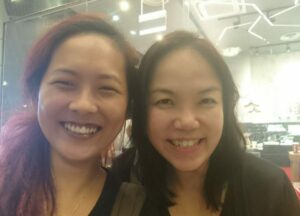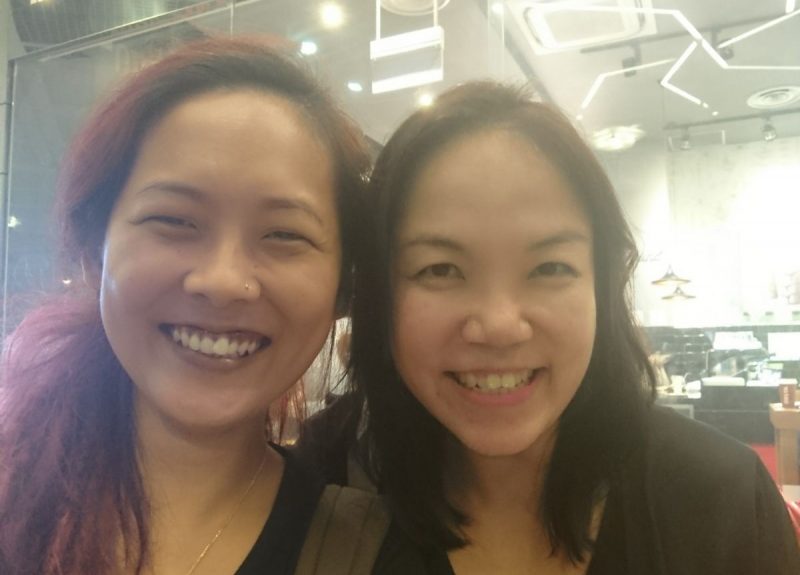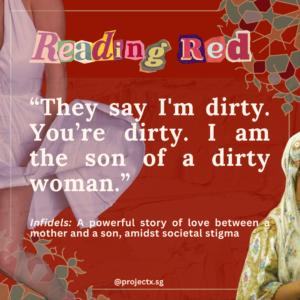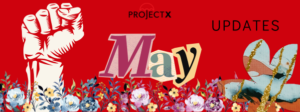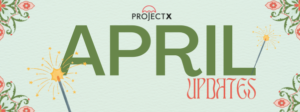As part of a sex workers’ rights organization, we very rarely hear about the history of the sex industry in Singapore, let alone one that is a personal account. Due to the stigma and shame surrounding the people involved in the sex industry, much of our very own history is lost. When I received a copy 17A Keong Saik Road, I finished it in record time. It provided me great insights not just about the history of Singapore, but also a deeper understanding about the cultural practices and human lives. It was educational, emotional, and enlightening. As such, I decided to contact Charmaine to find out more.
“17A Keong Saik Road recounts Charmaine Leung’s growing-up years on Keong Saik Road in the 1970s when it was a prominent red-light precinct in Chinatown in Singapore. An interweaving of past and present narratives, 17A Keong Saik Road tells of her mother’s journey as a young child put up for sale to becoming the madame of a brothel in Keong Saik. Unfolding her story as the daughter of a brothel operator and witnessing these changes to her family, Charmaine traces the transformation of the Keong Saik area from the 1930s to the present, and through writing, finds reconciliation.
A beautiful dedication to the past, to memory, and to the people who have gone before us, 17A Keong Saik Road tells the rich stories of the Ma Je, the Pei Pa Zai, and the Dai Gu Liong—marginalised, forgotten women of the past, who despite their difficulties, persevered in working towards the hope of a better future.”
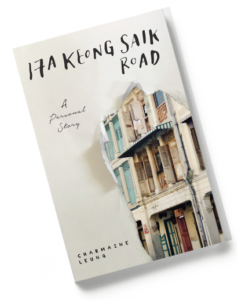
-
Let’s begin with terminology. You mentioned that you had a debate with your editor on whether or not to use the word “prostitute” or “sex worker”, and in your book, you used both terms. Can share a little bit about the thought process that went into the choice of words?
My first encounter with the word ‘prostitute’ was in Cantonese – ‘gai’ (which means chicken in Cantonese). I first heard it being used by the adults to refer to the working ladies in Keong Saik. When they spoke crudely and casually, they simply used the term ‘gai’. It is only when they chose to be a bit more conscientious with their speech that they called the ladies ‘dai gu liong’. As I child, I found out ‘gai’ was crude because no one ever called the ladies that in front of them, it was a term used only behind their backs.
‘Prostitute’ was a more formal term I learnt, but it was never used colloquially in Keong Saik. When I was writing 17A Keong Saik Road, there was discussion on the usage of ‘prostitute’ versus ‘sex worker’. I naturally used the word ‘prostitute’ in all my writing to refer to the ladies of Keong Saik, but was told later that the word ‘prostitute’ may have some negative connotation while ‘sex worker’ is a more neutral and generic term. I suppose that’s precisely why I used ‘prostitute’ so naturally at first, because all my life I’ve always known the girls of Keong Saik to be associated with something negative –something less proper and shameful.
Overall, we refer to the trade as ‘prostitution’, but in instances where we refer to the individual, we chose the term ‘sex worker’.
-
From your story, it is clear that you strongly felt the indirect/ secondary stigma being the daughter of a brothel boss. Do you still feel it now? What were some of the reactions you got from your book launch and the tours of Keong Saik you did?
No, I don’t feel the stigma anymore. Writing the book has definitely helped me to deal with the stigma and allowed me to claim that intrinsic part of our past that my mother and I have avoided talking about all these years. The reactions from the public have been very embracing. What was then family shame has now become a point of interest in conversations – something many people would like to know more about. It feels as if I have created a platform where many can now discuss this part of Singapore’s lesser known history openly.
-
It is clear that your book was about mothers and motherhood — about biological mothers, about surrogate mothers, and also about mamasans. I felt like the themes of motherhood came out strong with regards to biological mothers and surrogate mothers. Wondering if you could share more about the motherhood of mamasans?
The brothels in Keong Saik operated like a booking centre where working ladies were attached and could be booked for services. It was in the bigger brothels which had a large number of ladies that a mamasan’s role became especially crucial. There was always more at stake for the mamasans of these larger set-ups.
The mamasans often took care of and looked out for the ladies attached to their brothels. In Keong Saik, a brothel’s biggest asset were its ladies, and the mamasans needed to ensure they were well looked after. There were also instances where mamasans became friends with the ladies who were attached to the brothel(s) they managed – they were afterall women of similar fate, all trying to make a living in a red-light district.
-
You spoke briefly about the queer relationships between the Ma Jies in your book. Wondering if you could share a little more? Were they openly “lesbians”? Did they identify as “lesbians”? What terms did they use to describe their relationships? How did society or people around them treat their relationships?
Some of the queer relationships were fairly open. I know my grandaunt was very open about her relationship with some ladies. In fact, at one time, she was the target of two ladies who fought ferociously for her attention. Many of these queer relationships grew out of ‘sisterhood’, that is, the older and more established ma je looking after their younger counterparts who were new immigrants to Singapore, and eventually grew into love relationships. Like now, people in those days did not always approve of these relationships. Some gossiped maliciously while others did not want to acknowledge the existence of such relationships and pretended they were purely platonic.
-
Recently, Project X befriended someone whose grandmother was a sex worker. Her story is featured here.What would you say to her?
That’s a beautiful story! I would say to Melinda that there is a lot to be proud of her grandmother who became a sex worker to put her sister and daughter through school. How many people can be that selfless, and do this not merely for her own daughter, but also for a sibling? I know these stories really do exist, especially in the past when people have less means available to them. These are not plots in some drama series, because I have personally encountered ladies with similarly difficult lives and tales.
-
What are your thoughts about the way the sex industry is regulated in Singapore?
I cannot claim to know very well how the sex industry is regulated in Singapore. But I feel, regardless of whether it is regulated or not, the sex trade will always be there in any society. What is important is the society we live in needs to be aware that it exists, and not sweep it aside simply because it is a difficult topic to discuss. It is only with awareness that we will have more understanding – everyone has their own story – we can’t assume we know it all and start getting judgemental.
-
Finally, anything else you would like to add?
I hope 17A Keong Saik Road is able to bring forth the message of the universality of love. Where and when there is love, people have the capacity to expand themselves and give their very best despite hardship. It is love that makes people resilient and have hope to move forward in the face of great difficulties.
